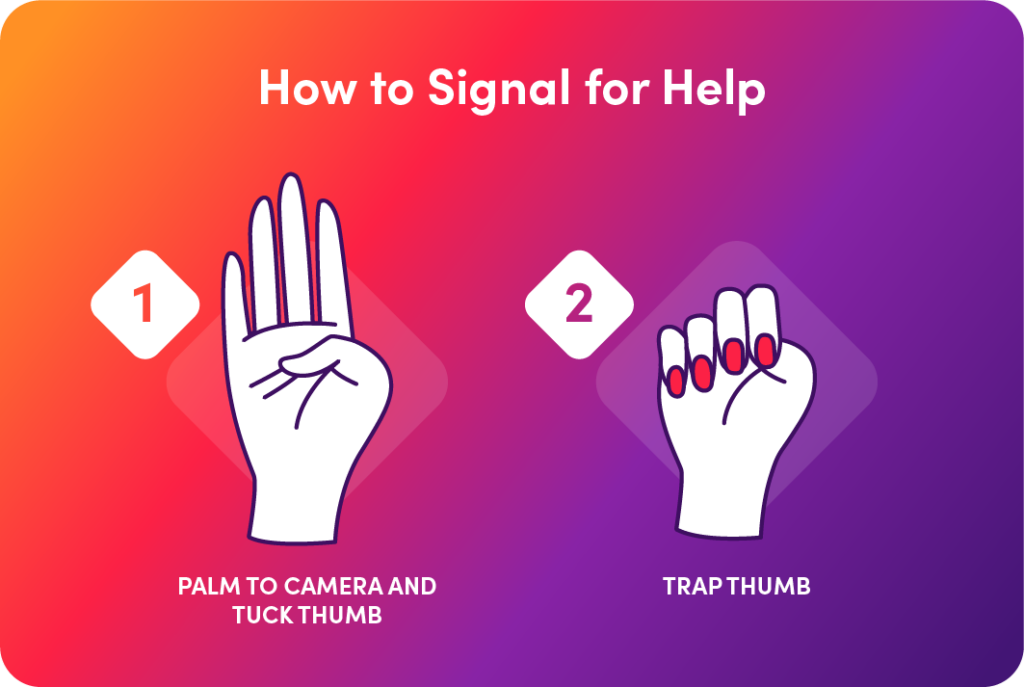Physical Safety
National Domestic Violence Hotline 1-800-799-7233
Hours: 24/7. Languages: English, Spanish, and 200+ others through interpretation service
Did you know?
You do not have to share where you live or where you are staying with your abuser.
There are many ways to track someone/something, including your car, through Bluetooth tracking devices.
If you are preparing to leave an abusive relationship:
- Keep any evidence of physical abuse, like pictures and copies of medical documents.
- If possible, keep a journal of violent incidences with dates, what happened, and threats made.
The Women’s Funding Network and the Canadian Women’s Foundation created a universal distress signal. It’s simple: tuck your thumb into your palm before closing your fingers over it. This silent signal is a discreet way to show others that you may be in a dangerous situation.

Suggestions
Stalking
Try to vary your routes to and from work or school, the grocery store, and any other places regularly visited. By changing your daily routes, it could make it more difficult for someone to learn your routine – however, be aware that a stalker may put a GPS monitoring device on your car or cell phone. One clue that GPS device may be installed is if you are varying your routes or going to unexpected places, but the stalker still seems to find you.
Traveling
When traveling, please try to maintain awareness.
Tracking
If you suspect your vehicle is being tracked, find a trusted mechanic. Many car shops will look for a tracking device for free.
https://www.wikihow.com/Find-a-Hidden-Tracker-on-a-Car
Here’s how you can check if you’re being tracked by an Apple AirTag;
Go Bags
Create a Go Bag when you may need to flee in a hurry. Keep your Go Bag somewhere you could easily access it if you had to leave in a hurry, like the trunk of your car, near your front door, or at a trusted friend’s house. Try to keep your phone charged and your car full of gas, just in case.
Your Go Bag could include:
- Birth certificates and social security cards for yourself and your children
- Driver’s license and/or passports
- Marriage, divorce, or custody papers
- Legal protection or restraining orders
- Health insurance cards and medical records
- Immunization records
- Car title, registration, and insurance documentation
- Cash and prepaid credit cards that can’t be traced
- Prepaid cell phone or a cell phone with a new contract and number. Try to keep it fully charged.
- Current medications and prescriptions for yourself and your children
- Clothing for you and your children
- Keepsakes
- Spare set of keys
Utilities
When you no longer live with your abuser, consider putting the utilities in someone else’s name if you are worried about your abuser finding you.
For additional support, please view our list of helpful apps:
Other Safety Resources
Legal Safety
Financial Safety
Technological Safety
Emotional Safety
Helpful Apps
This page provides information, content and materials for general informational purposes on domestic violence and related subjects. The words and other content provided on this webpage, and in any linked materials, are not intended to be and should not be construed as medical, mental health, or legal advice related to domestic violence nor can the information deemed to be the most up-to-date, as this information is continuously developing. The links to other third-party websites are for the convenience of the reader, user or browser; MTAP does not recommend or endorse the content of the third-party websites.
© 2024 TCC Gives dba More Than a Phone
All rights reserved.
National Domestic Violence Hotline:
1-800-799-SAFE

